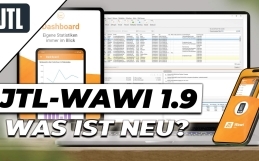Workflows
In a nutshell…
- JTL Workflows are freely definable if-then loops for workflows and can be used for frequently recurring similar tasks .
- The advantages of automated workflows are the prevention of application errors in day-to-day operations on the one hand and the reduction of routine activities on the other.
- Common application examples can be found in purchasing, customer management, order processing, shipping, invoicing, quoting, and warehouse management.
- A short tutorial on how to implement a work process with a JTL workflow can be found below.
What are JTL Workflows?
JTL users will know it – when working with JTL Wawi, there are a lot of smaller and larger tasks that need to be performed sometimes less frequently and sometimes more frequently. Basically, all tasks can be done by hand but since we online merchants are lazy by nature (we say efficient), we naturally want to spend as little time as possible on the “un-sexy” parts of our business. Making business contacts or developing new crazy product ideas is a lot more fun than creating a shipping label for the hundredth time. What a luck that the nice developers of JTL introduced JTL Workflows with version 1.0 2 years ago!
Simply put, JTL Workflows are freely definable if-then loops for workflows that the user can create independently within JTL Wawi. These loops can be used anywhere along the process chain and run automatically in the background. Thus, a JTL user does not notice them and can work undisturbed in the Wawi.
A workflow always consists of 3 parts:
- Triggering event (e.g. “Order created”) – this can be triggered either automatically or manually
- Optionally one or more conditions (e.g. “delivery address is a packing station”)
- One or more automatic actions (e.g. “Shipping method is changed to DHL Paket”)
The use and meaningfulness of workflows are always in the decision-making power of the user. You can decide for yourself whether you want to be supported by five, one hundred or no workflow at all. JTL Workflows thus allow automation that is tailored exactly to the needs of the respective merchant.
The advantages of JTL Workflows
The use of JTL Workflows is suitable wherever frequently recurring tasks of the same type are to be processed. Some examples of processes that can be automated are:
- Arrange delivery after receiving a payment
- Automatically change the shipping method for a specific order type
- Put missing items on the shopping list if one or more delivery items cannot be served
- Email notification to admin due to missing title tags in metadata.
Two major advantages of automated workflows are the prevention of application errors in day-to-day operations on the one hand and the reduction of routine activities in the Wawi on the other. No matter how good your employees are, mistakes can never be completely avoided in manual work. Workflows are an ingenious way to eliminate these careless errors in simple recurring tasks. Furthermore, your employees are relieved by the automation and can use their brainpower more efficiently where it is really needed. In short: You save time and thus also costs.
Practical examples include :
- Remove special characters from street names
- Automatically correct addresses without house number
- Manually check orders to specific countries
- Deliver after payment
- Missing meta information
- Stock shopping list
- Change shipping method
- Export declaration non-EU
- Automate dropshipping
- Check duplicate customers
- Commission calculation for authors
- Set up shipping flat rate
- Change shipping method if customer uses Packstation and DHL is not selected
- Packing station is not under “Street
- Move postal number to the Address suffix field
- Payment reminder and automatic cancellation
These examples are only intended to outline the principle implementation of a work process. However, implementing more complex workflows is also no problem. In addition to dozens of conditions and actions, workflows can also be designed to run only at certain times, for example. However, the basic functions are not that difficult to understand and offer real added value for your business.
Conclusion
For any merchant with frequently recurring routine activities, JTL Workflows are an indispensable tool for daily use. Once you get the hang of it, the tool offers you almost unlimited possibilities to automate your own workflows. This not only saves you time and money, but also eliminates potential sources of error. JTL Workflows are definitely worth a look!
You can find more information about JTL Workflows and detailed example videos in the JTL Onlineguide: https://guide.jtl-software.de/Kategorie:JTL-Workflows.


















